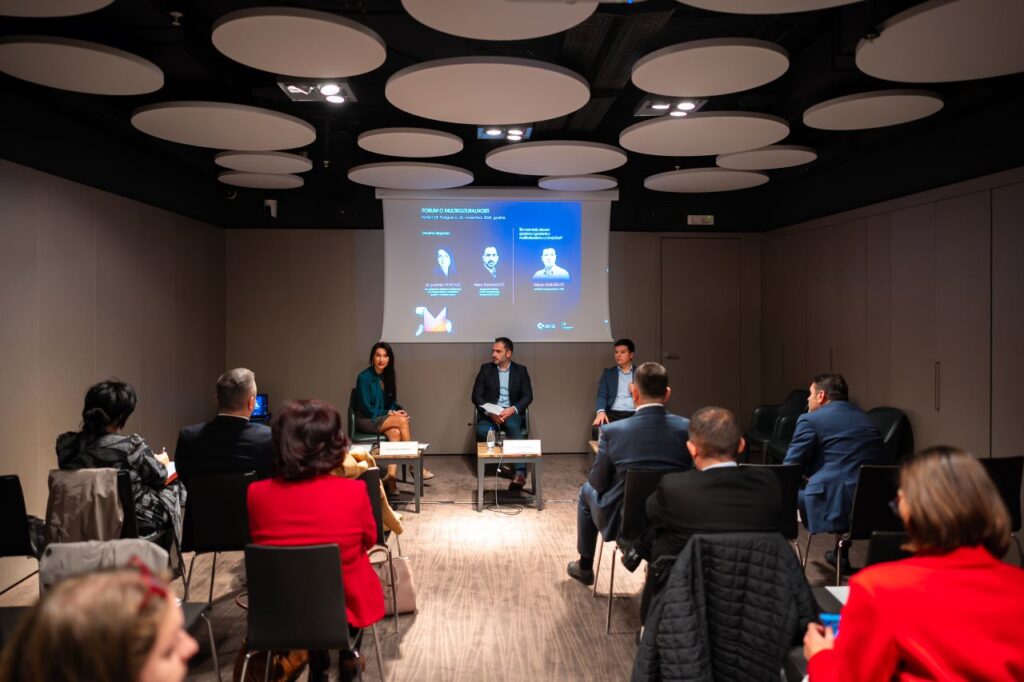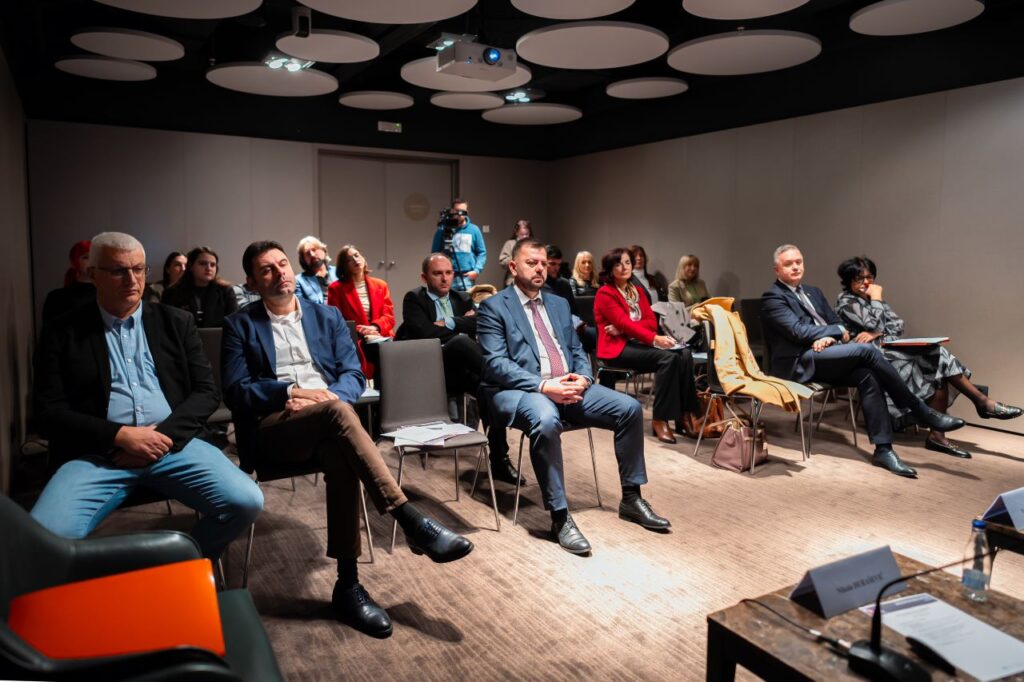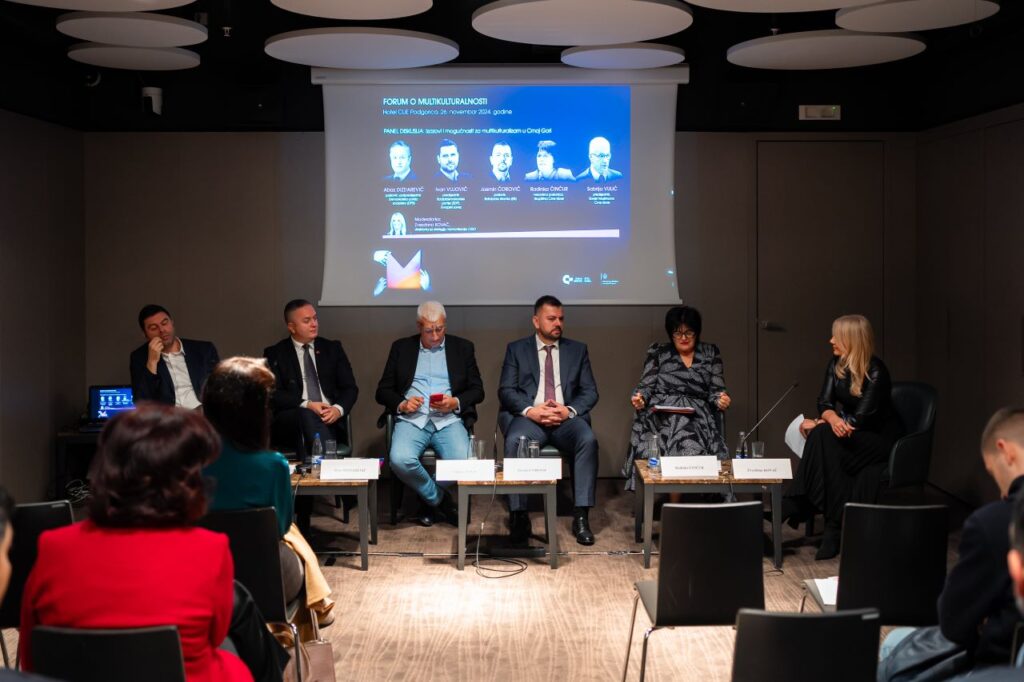“Data on multiculturalism, as well as current practices, indicate the need for greater engagement of all stakeholders in promoting mutual understanding and reducing discrimination to ensure a genuinely multicultural society in Montenegro. However, it is increasingly evident that the concept of multiculturalism poses an obstacle to certain political interests, which seek to undermine it,” was one of the key messages from the Forum on Multiculturalism organized today by the Centre for Civic Education (CCE) in Podgorica, with support from the Ministry of Human and Minority Rights.
“We are working on the first draft of the Strategy for Social Cohesion because this is a critical moment where we must stand behind the values we share. We need a new narrative, a new social contract, which will establish the value and significance of everything we do, so we can feel dignified and prepared for future challenges,” said Ljudmila Popović, Acting Director General of the Directorate for Interculturalism at the Ministry of Human and Minority Rights, during her opening remarks. Popović emphasized that multiculturalism is a reality in Montenegro, with each city having its specific character due to ethnic and identity diversity. “Multiculturalism has taught us that we must live harmoniously and respect the rights and freedoms of others. However, this concept is often misused, leading to divisions, and we all must work together toward a common goal,” she stated. Popović called for a shift from multiculturalism to interculturalism, emphasizing active collaboration and understanding. “Interculturalism is a developmental guideline that leads to progress,” Popović concluded.
“Montenegro is a country rich in history and diversity but faces challenges in preserving a shared multicultural identity,” said Petar Đukanović, Programme director at the CCE, in his opening address. He stressed the importance of society and the state confronting the past in an open and honest way. “Re-examining historical events, policies, and social practices that led to injustices, discrimination, or conflicts among various ethnic, religious, and cultural groups is a prerequisite for building trust and harmonious relationships in society,” he assessed. Đukanović highlighted the necessity to strengthen education promoting tolerance, support NGOs, enhance institutional transparency, and ensure more responsible media reporting. “Without encouraging dialogue and cultural exchange among communities, there can be no society based on solidarity and mutual understanding. This requires the engagement of all social actors,” Đukanović stated.
Nikola Đurašević, Programme associate at the CCE, presented the findings of research on perceptions of multiculturalism in Montenegro, which covered the general and high school populations. “While the initial impression of the majority—76.8% of citizens—is that Montenegro is a multicultural society, this percentage has dropped by nearly 5% compared to 2023. At the same time, the perception of those who do not see Montenegro as multicultural has increased from 18.3% to 23.2%. Among young people, 70.1% believe that our society is multicultural, while 14.8% disagree, and 15.1% are undecided. At the CCE, we believe these findings should already be taken seriously, especially because further data I will present show that beneath this surface perception lies significant questioning of the assumed stance on multiculturalism,” Đurašević stated. He also highlighted concerns about perceived discrimination based on religion and nationality, as well as the privileging of certain ethnic groups. “Particularly concerning is the increased reluctance to interethnic marriages. In 2024, 52.3% of citizens stated they would not marry someone of another ethnicity, compared to 50.4% in 2023. Among young people, 55.6% are open to such relationships, but a significant 44.4% reject the idea,” he explained.
Following the introductory session and the presentation of the research, a panel discussion focused on the challenges and opportunities for multiculturalism in Montenegro.
“These research results are not surprising, given the current developments in the country and on the geopolitical scene. Montenegro is not an isolated system,” said Abaz Dizdarević, an MP and Vice President of the Democratic Party of Socialists (DPS). “It is crucial to recognize polarization and negative trends that deepen societal divisions,” he emphasized, adding that political actors and civil society must work together to find a way out of this situation. “The cyclical nature of historical events has brought us to the civilized society we have today, and this should remind us that nothing starts with us; it is the result of past actions,” he noted. He also stressed the need for improved communication with youth, pointing out that civil society often outperforms politicians in this regard. “A revolution in education doesn’t mean a return to the past or dogmas. Montenegro’s constitutional framework resolves the issue of societal organization—there are licensed schools for religion, while secular schools should focus on civic education,” he added.
“Everything happening in our society is a consequence of political processes. I believe we are witnessing regression and negative trends induced by these unfinished political processes,” said Ivan Vujović, President of the Social Democratic Party (SDP) and a European Alliance official, commenting on the research results. “Unfortunately, as a society, we haven’t mustered the strength to confront the fundamental regression of the 1990s. Our young people don’t know what happened in the 1990s, and that’s why these years are being recycled today in different forms, strongly felt in society,” Vujović noted. “We must go through the process of confronting the past because even today, we relativize what happened to us. Out of such ignorance and lack of understanding of the past, a flawed ideology that we once discarded is making its way back to us, and that is not a path forward,” stated Vujović.
“The change of government in 2020 and the formation of the so-called apostolic government significantly undermined multiculturalism through ‘cleansing’ institutions and aligning personnel based on their declarations. Such an approach could not endure for long; Montenegrin society responded with resistance,” stated Jasmin Ćorović, Member of Parliament and Vice President of the Bosniak Party (BS). He highlighted those attitudes towards certain events, such as Srebrenica, where a minister failed to meet the test, sent a clear message that mono-religious governments cannot succeed in Montenegro. Ćorović believes that a civic society exists in Montenegro and should serve as the foundation for future progress, reminding us that many contemporary problems have historical roots. “We cannot effectively address current issues without revisiting history. We must not ignore past problems because nationalism, which had been subdued, escalated into wars whose consequences we still feel. Even today, we have political parties exploiting these narratives,” Ćorović emphasized. Expressing his views on religious education, he affirmed his support for the secular nature of the state, stating, “Introducing religious education into the school system is neither good for education nor for religion.” He concluded that the key lies in fostering civic awareness, with political parties, NGOs, and education being essential for forming a rational and conscientious society.
Radinka Ćinćur, an independent MP in the Montenegrin Parliament, also viewed the research findings as unsurprising. “We sense that societal themes are shifting from civic to national issues… I believe we need to show more openness and understanding for others. I was encouraged by the idea that should unite us all: patriotism based on a fair relationship with the country, its people, and everyone in it,” she said, expressing understanding for the challenges young people face. “I always believe that youth are the victims of our political processes, distorted values, and the void in the cultural scene. It’s evident that we are not offering them what they need, so they turn to other pseudo-values. Our education system is flawed and must be reformed—critical thinking is not at the level it should be. We must clearly identify what is lacking, work on it, and catch up with European educational standards,” she stated, advocating for the inclusion of multiculturalism and ethics in the education system across various subjects. However, she added that she personally opposed introducing religious education in schools unless there was a majority consensus.
“We can worry about the negative trend reflected in the research; the results are alarming and are a consequence of negative political conditions where right-wing forces dominate, both globally and within our society. It feels as though we are being forced into separate enclosures, which is the core issue,” said Sabrija Vulić, President of the Council of Muslims of Montenegro. He explained that for him, religion is a private matter, and problems arise when it begins to manifest publicly. “In the past ten years, I have experienced severe national insults. We face a problem that we cannot ignore and must discuss. Regarding multiculturalism, I will draw a comparison: the problem of multiculturalism does not exist in crime—why? Because there is a shared goal. The question for everyone is: Should Montenegro be our shared goal? Regardless of faith or nationality, we must aim for the same goal and unite. Multiculturalism requires a shared objective, whether economic or civic; the essence lies in having a common goal. However, it appears that, in our circumstances, it becomes an obstacle to political interests,“ he concluded.
The forum, which brought together decision-makers, representatives of academia, and civil society, aimed to provide a platform for exchanging ideas and experiences to strengthen awareness of the importance of multiculturalism in Montenegrin society.
The event was organized as part of the Multiculturalism in Focus project, financially supported by the Ministry of Human and Minority Rights.
Maja Marinović, Programme associate



